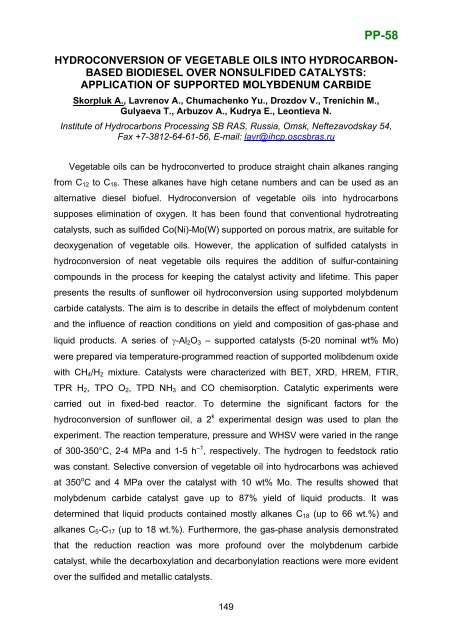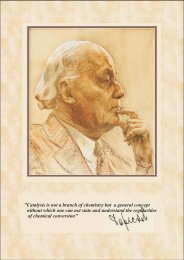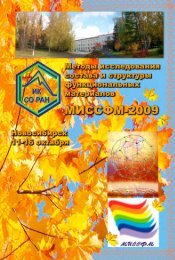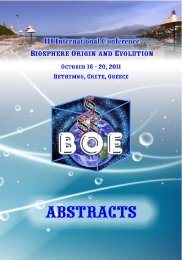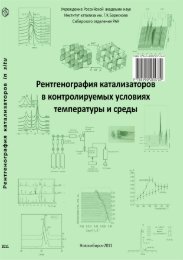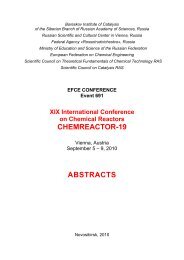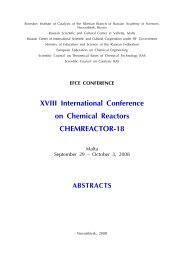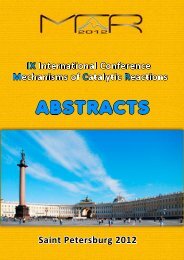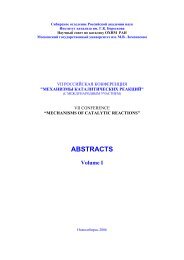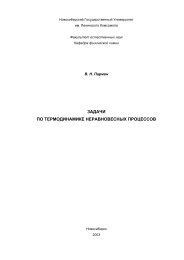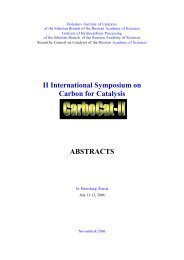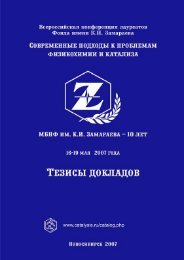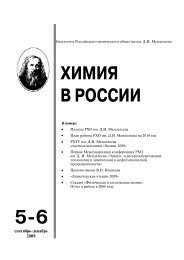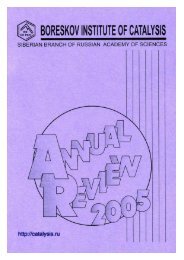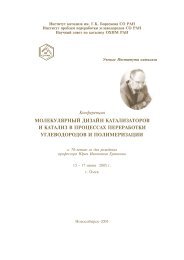Boreskov Institute of Catalysis SB RAS, Novosibirsk, Russia
Boreskov Institute of Catalysis SB RAS, Novosibirsk, Russia
Boreskov Institute of Catalysis SB RAS, Novosibirsk, Russia
- No tags were found...
Create successful ePaper yourself
Turn your PDF publications into a flip-book with our unique Google optimized e-Paper software.
PP-58HYDROCONVERSION OF VEGETABLE OILS INTO HYDROCARBON-BASED BIODIESEL OVER NONSULFIDED CATALYSTS:APPLICATION OF SUPPORTED MOLYBDENUM CARBIDESkorpluk A., Lavrenov A., Chumachenko Yu., Drozdov V., Trenichin M.,Gulyaeva T., Arbuzov A., Kudrya E., Leontieva N.<strong>Institute</strong> <strong>of</strong> Hydrocarbons Processing <strong>SB</strong> <strong>RAS</strong>, <strong>Russia</strong>, Omsk, Neftezavodskay 54,Fax +7-3812-64-61-56, E-mail: lavr@ihcp.oscsbras.ruVegetable oils can be hydroconverted to produce straight chain alkanes rangingfrom C 12 to C 18 . These alkanes have high cetane numbers and can be used as analternative diesel bi<strong>of</strong>uel. Hydroconversion <strong>of</strong> vegetable oils into hydrocarbonssupposes elimination <strong>of</strong> oxygen. It has been found that conventional hydrotreatingcatalysts, such as sulfided Co(Ni)-Mo(W) supported on porous matrix, are suitable fordeoxygenation <strong>of</strong> vegetable oils. However, the application <strong>of</strong> sulfided catalysts inhydroconversion <strong>of</strong> neat vegetable oils requires the addition <strong>of</strong> sulfur-containingcompounds in the process for keeping the catalyst activity and lifetime. This paperpresents the results <strong>of</strong> sunflower oil hydroconversion using supported molybdenumcarbide catalysts. The aim is to describe in details the effect <strong>of</strong> molybdenum contentand the influence <strong>of</strong> reaction conditions on yield and composition <strong>of</strong> gas-phase andliquid products. A series <strong>of</strong> γ-Al 2 O 3 – supported catalysts (5-20 nominal wt% Mo)were prepared via temperature-programmed reaction <strong>of</strong> supported molibdenum oxidewith CH 4 /H 2 mixture. Catalysts were characterized with BET, XRD, HREM, FTIR,TPR H 2 , TPO O 2 , TPD NH 3 and CO chemisorption. Catalytic experiments werecarried out in fixed-bed reactor. To determine the significant factors for thehydroconversion <strong>of</strong> sunflower oil, a 2 k experimental design was used to plan theexperiment. The reaction temperature, pressure and WHSV were varied in the range<strong>of</strong> 300-350°C, 2-4 MPa and 1-5 h –1 , respectively. The hydrogen to feedstock ratiowas constant. Selective conversion <strong>of</strong> vegetable oil into hydrocarbons was achievedat 350 o C and 4 MPa over the catalyst with 10 wt% Mo. The results showed thatmolybdenum carbide catalyst gave up to 87% yield <strong>of</strong> liquid products. It wasdetermined that liquid products contained mostly alkanes C 18 (up to 66 wt.%) andalkanes С 5 -С 17 (up to 18 wt.%). Furthermore, the gas-phase analysis demonstratedthat the reduction reaction was more pr<strong>of</strong>ound over the molybdenum carbidecatalyst, while the decarboxylation and decarbonylation reactions were more evidentover the sulfided and metallic catalysts.149


